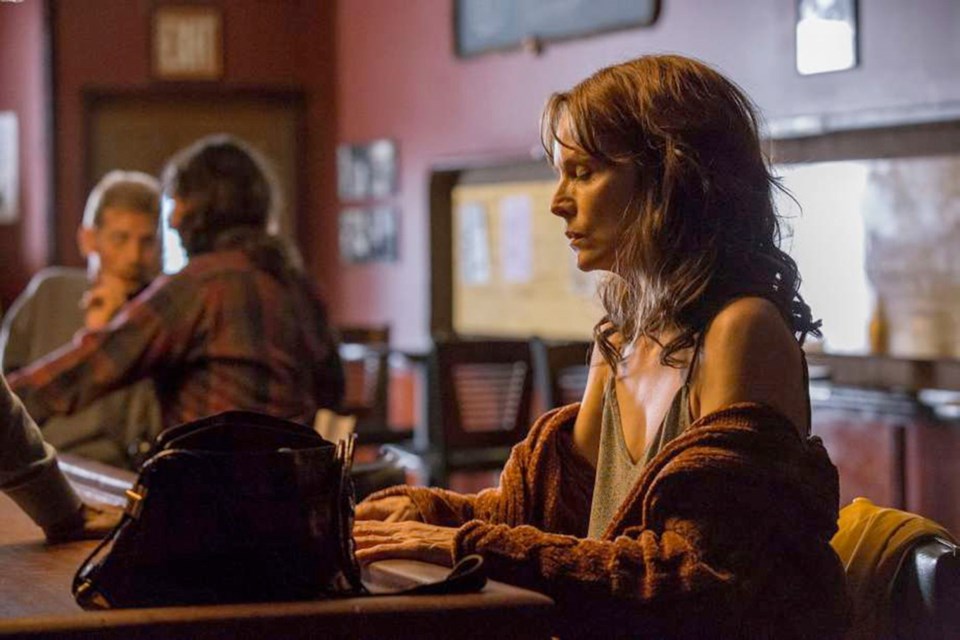Kyra Johnson, middle-age, divorced and unemployed, looks after her elderly mother in their small New York apartment. Mom isn’t long for this world, and in time, you might start to suspect something similar about Kyra. She hasn’t had a job since she was laid off two years ago, though not for lack of trying. She’s beautiful — to put it another way, she’s played by Michelle Pfeiffer — but her beauty, much like her pain, is something the world has long ceased to notice, much less concern itself with.
That more or less explains who Kyra is. As for Where is Kyra?, the title of Andrew Dosunmu’s grave, searing and determinedly low-wattage new drama, the question is apparently meant to be taken quite literally. Much of the movie, shot by the brilliant cinematographer Bradford Young, unfolds in rooms and offices cloaked in thick, impenetrable shadows, with Kyra’s forlorn silhouette often lurking at the margins of the frame. You might have to go back to the cinematographer Gordon Willis’s work on The Godfather: Part II to see darkness employed to such powerfully cavernous effect.
Its visual extremity aside, Where is Kyra?, written by Darci Picoult, might at first seem to be a straightforward if unremittingly bleak drama of economic anxiety. Once her mother (Suzanne Shepherd) is gone, relieving her of one burden, but immediately imposing another, Kyra begins her sad, steady descent into desperation and petty criminality, a journey set to the pulse of a psychological thriller and punctuated by the nerve-shredding eruptions of Philip Miller’s score.
Offering Kyra some respite from her woes is a lover, Doug (an excellent Kiefer Sutherland), who picks her up at a bar, not long after she learns her credit card has been rejected. Doug turns out to be only slightly better off, with his own hard-knock history to boot. He tries to help and keep her out of trouble, not realizing until too late that he’s playing the chump in a modern-day noir, which makes Kyra the most dangerous kind of femme fatale — the unwitting kind.
Dosunmu, a Nigerian-born director with a background in photography, isn’t a fatalist at heart, though as with many other filmmakers, he seems enthralled by the spectacle of a woman on the verge. His previous picture, Mother of George (2013), was a vibrant Brooklyn-set melodrama about a Nigerian immigrant striving to uphold her cultural traditions and adapt to the pressures of a new marriage. In Young’s hands (which have since gone on to do similarly stunning work in Arrival and Selma), the movie became a ravishing interplay of hues and textures, an exquisitely bejewelled shadow play.
In Where is Kyra? those shadows have deepened and lengthened. With the occasional exception of flashing red police sirens or the striking yellow coat Kyra likes to wear, nearly all bright colours have been carefully drained from the frame. But if Young’s work here is another master class in painterly under-lighting, then Pfeiffer’s brilliantly self-effacing performance feels sculptural, by comparison. Remarkably, she doesn’t compete with the movie’s rigorous visual scheme; she completes it. Her powers of expression, far from being obscured by all this darkness, are instead enriched and heightened by it.
I am surely not the only moviegoer who, over the years, has been moved to ask: “Where is Michelle Pfeiffer?” — a question that was recently and gratifyingly answered by her expert supporting performances in mother! and Murder on the Orient Express.
Those willing to seek out Dosunmu’s movie will find an even more satisfying if undeniably challenging answer.
There are some who might quibble with the decision to cast a movie star as a woman of extremely limited means — a judgment that effectively reduces good acting to a purity test, rather than a feat of imaginative empathy. Which is not to say that Pfeiffer’s performance is entirely devoid of subtext. In the context of an industry not known for its kindness to women over 35, there is something strangely right about one of our most criminally underemployed actors taking on the role of a woman whom time forgot.
Pfeiffer disappears into Kyra, and Kyra disappears into the movie. Dosunmu delights in playing hide-and-seek with his protagonist, disguising her in more ways than one; he reminds us that crushing poverty has a way of obliterating one’s entire identity.
But then, just when we think Kyra might slip away for good, the camera suddenly moves in for a tightly framed, perfectly chiselled close-up, revealing her in all her unadorned anguish.
This woman might be lost to the world, but in Dosunmu’s quietly shattering vision, she is also unexpectedly, triumphantly found.



